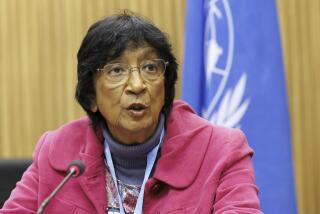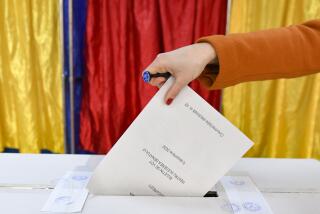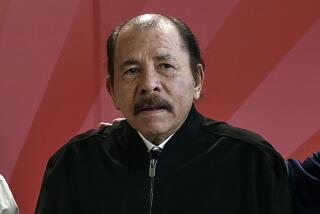Commitment to Human Rights Waning, Group Says : Survey: Report accuses Western powers of placing economic opportunities over democratization.
- Share via
WASHINGTON — The world’s major powers, including the United States, have “regularly shirked” their duties on human rights issues through most of the 1990s, according to a survey released Thursday by Human Rights Watch, a private watchdog group.
Western indifference or inaction is slowing the global trend toward democratization and putting at risk the rights of millions--if not hundreds of millions--of people, Kenneth Roth, executive director of the group, said in an interview.
“The first half of this decade saw a waning of the will to uphold human rights among major powers,” the report charges. “Governments feared that the vigorous defense of these rights might offend trading partners and risk economic opportunities.”
The Clinton administration in particular has a “persistent tendency” to surrender commitment to human rights principles in the name of potential profit in countries as diverse as China and Nigeria, states “Human Rights Watch World Report 1996.”
Yet the last year has demonstrated the futility of such compromises, the survey concludes, saying that U.S. attempts to use constructive engagement in China--by renewing most-favored-nation trading status as an incentive to improve human rights--proved to be an “utter failure.”
The report also singles out U.N. Secretary-General Boutros Boutros-Ghali for his reluctance to offend powerful governments engaged in major abuses and for “grievously” abdicating leadership at the very body that first outlined a global standard on human rights.
Human Rights Watch, which is based in New York, says Boutros-Ghali had “no comment” on Chechnya’s war, lacked leadership in dealing with the savagery in Bosnia-Herzegovina and failed to criticize China for its handling of the U.N. Conference on Women in September.
Many other key leaders, the report adds, generally offer support on rights issues that is “belated, inconsistent and grudging.”
“To justify inaction in the face of ethnic slaughter, they portrayed such carnage as timeless and inevitable. To allay calls to bring mass murderers to justice, they created international tribunals but denied them political and financial backing,” the report charges.
The International Tribunal for Rwanda, for example, has faced funding shortages, untrained personnel and foreign disinterest, jeopardizing a chance to reduce ethnic strife, the report says. The lack of progress has allowed those responsible for the genocide to rearm and has prevented 2 million refugees from returning home, it says.
Many of the most outspoken Western governments are also still selling arms to some of the most repressive regimes, the report says. Until Nigeria executed nine Ogoni dissidents last month, Britain sold weapons to the military regime despite the junta’s abrogation of democratic elections and a 1993 European Union ban.
*
The problems are not limited to major powers, according to the rights organization. Several states supposedly in transition to democracy have hijacked the process, often by staging elections that are manipulated, the report charges.
For example, Kazakhstan dissolved its parliament and, after canceling 1996 presidential elections, extended the president’s term until the year 2000.
The report cites several instances in which it says the U.S. human rights record at home worsened in 1995:
* Congress attacked due process and freedom of expression, while three Supreme Court decisions weakened protections on voting, education and employment for women and minorities.
* Racism, gender discrimination and campaigns against immigrants are pervasive.
* Concerns over police misconduct escalated as officers in several cities were accused of serious rights violations, unchecked by state or federal officials.
* The pace of executions grew to new highs, while incarcerations soared.
The good news in the 1995 survey is that, despite lack of official support, private human rights groups made progress, even gaining new footholds in long-hostile areas, such as sub-Saharan Africa.
Some new democracies are showing progress, the report says.
“The positive sign this year is the global clamor for justice to ensure past abuses aren’t forgotten. There is a growing feeling [that] they must be dealt with to establish the rule of law and to prevent repetition of atrocities,” Roth said.
In 1995, former officials from South Africa’s apartheid era, Ethiopia’s Marxist government and South Korea’s military regime were charged with crimes from the 1980s.
More to Read
Sign up for Essential California
The most important California stories and recommendations in your inbox every morning.
You may occasionally receive promotional content from the Los Angeles Times.













